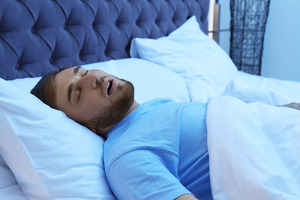3 Key Factors That Might Be Making Your Sleep Apnea Worse
September 18, 2025

Are you currently looking for a solution for your sleep apnea? If so, it’s important to be aware of the variables that could be making the problem worse. Several lifestyle habits and health conditions can have a negative impact on your sleep-disordered breathing, and you need to address them if you want to enjoy more restful nights again. Below are 3 factors that can make sleep apnea more severe along with steps you can take to deal with them.
1. Being Overweight
Obesity and sleep apnea tend to be closely linked. When you’re overweight, fat deposits can form in your neck and potentially obstruct your airway while you sleep, thus resulting in pauses in your breathing. On top of that, a lack of quality sleep can cause an imbalance of the hormones that control appetite, making you more prone to overeating. In other words, sleep apnea and weight gain can easily contribute to each other.
If your sleep apnea is related to obesity, losing weight can make a significant difference. You can talk to your regular physician to see what strategies they recommend for reducing your weight to healthier levels.
2. Sleep Position
Do you tend to sleep on your back? Believe it or not, this could actually be worsening your sleep apnea. While you’re in this position, your tongue can easily fall toward the back of your throat and block the airway.
Generally speaking, it’s better for people with sleep apnea to sleep on their sides. To train your body to adopt a new sleeping position, try attaching a tennis ball or a rolled-up pair of socks to the back of your pajamas. This will make lying on your back uncomfortable, thus encouraging the transition to sleeping on your side.
3. Alcohol Before Bed
One of the side effects of alcohol is that it relaxes your muscles, including those in your throat. Consequently, if you drink alcohol shortly before falling asleep, your throat muscles will be more likely to relax and cause an airway obstruction.
Staying away from alcohol in the evenings will help minimize the impact it has on the quality of your sleep. Try to avoid consuming any alcoholic beverages within three or four hours of your normal bedtime.
Remember, having your sleep apnea treated by a professional is important, but you’ll have a much easier time getting your disorder under control if you properly address the factors contributing to it.
About the Author
Dr. Steve W. Cobb has been in the dental field for more than 45 years. He is a graduate of Baylor School of Dentistry, and he is currently putting his advanced dental education to good use by bringing patients in Odessa the quality care that they deserve. To help patients struggling with sleep apnea, he offers customized oral appliances. If you’re looking for treatment for sleep disordered breathing, you can schedule a consultation with Dr. Cobb by visiting his website or calling (432) 367-4774.
No Comments
No comments yet.
RSS feed for comments on this post.
Sorry, the comment form is closed at this time.


 (432)
367-4774
(432)
367-4774